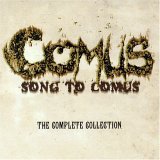 This long overdue double-disc compilation not only makes Comus' superlative First UtteranceLP widely available at an affordable price for the first time, it alsoincludes the legendary band's oft-ignored second album and a handful ofrare tracks, singles and b-sides.
This long overdue double-disc compilation not only makes Comus' superlative First UtteranceLP widely available at an affordable price for the first time, it alsoincludes the legendary band's oft-ignored second album and a handful ofrare tracks, singles and b-sides.Previously, the only way to hear muchof this music was to track down the original Pye/Dawn LPs, whichfrequently trade hands for upwards of a thousand dollars for a VG+copy, or to buy one of the exorbitantly priced bootleg CD reissues thathave surfaced on Korean and Japanese labels over the years. Indeed, First Utteranceis probably the ultimate psych-folk Holy Grail, a storied and obscurealbum that more than earns its reputation. In writing this review, Ihad to make an effort to remain as dispassionate as possible, as First Utteranceis certainly one of my top five favorite albums of all time, and I'vebeen obsessively trying to uncover its mysteries over the period ofeight years since I first heard it. This album, along with Jan Dukes DeGrey's Mice and Rats in the Loft, is probably the truestmanifestation of the genre sometimes called "progressive folk," assongs with a distinctly Brit-folk vibe are stretched out into dynamic,multi-part convocations, joined together with instrumental passages ofacoustic guitar, reeds and hand percussion. Far from being the sort ofcontrived, antiseptic art-rock normally associated with the"progressive" tag, the music made by Comus is fierce and visceral,passionate and intense, living in an ever-present now. To listen to First Utteranceis to be kidnapped by cult of forest-dwelling mages and witches, whodrug you, blindfold you, strip you naked and convey your cold,quivering corpus to a clearing in the woods, where you are forced toparticipate in an ancient initiation rite. Along the way areinvocations of the huntress-goddess Diana, chilling murder ballads,songs of praise to a malevolent demon, stories of necrophilia,crucifixion and insanity. There are moments of fragile, pastoral beautyon First Utterance, but they are interrupted at unpredictableintervals by the frightening howls, growls and vocal ululations ofsinger Roger Wootton. It's frequently amazing just how much power andferocity the quintet are able to pull out of their completely acousticinstruments, making the album also function as a sort of unpluggedproto-Metal album. Songs seem to slither and pulsate, with their ownphantasmagorical logic, traveling from innocuous nature hymns setagainst placid folk music, to anarchic, tribalistic surrenders to thenightmarish and Satanic, often within the same song. This frighteningdynamism led David Michael Formerly Tibet to declare that First Utterance was his favorite album of all time, and Current 93 covered "Diana" on their HorseyEP. The band is also on the Nurse With Wound list, and are frequentlynamechecked by a slew of recent "freak-folk" acts, many whom, shall wesay, have "borrowed" their eccentricities from Comus' monolithic LP.Besides a great remastering job, which renders the album clearer andlouder than ever before, this package also includes extensivebiographical notes, photographs and reproductions of the LP art. Thisdouble-disc set also includes the entire Diana 12" maxi single,which contained two seldom heard b-sides, as well as a previouslyunreleased track ("All the Colours of Darkness") very much in the samevein as the First Utterance material.
And then there is disc two, which contains Comus' much-maligned sophomore effort To Keep From Crying. The album was released in 1974 on Virgin Records to very little fanfare, much like the first record, only in the case of Crying,its failure was very much deserved. In fact, the more I listen and tryto reconsider my opinion about Comus' artistically compromised secondalbum, the more I am convinced that it is absolutely the worst secondalbum I've ever heard. The edgy, insanely creative and instrumentallyproficient Comus from the first album is nowhere in sight, and in itsplace is nothing but a throwaway piece of MOR folk-rock fare, poorlyproduced and containing no memorable songs. Apparently the album wasmade rather begrudgingly by a band that, only a few months before, haddecided to break up for good. This lack of elan is clearly in evidenceon To Keep From Crying, and though I can't help but think thatI might like the album better were I not comparing it to a masterpiecelike First Utterance, it doesn't change the fact that this is indeedthe same Comus who recorded that great LP, and it's downright tragic.The band members interviewed for David Wells' liner notes allude totheir desire at that time to record an album that would be more likelyto sell. Money and fame have never been particularly good motivatingfactors for great art, and this just proves it once again. However,even though I don't care to listen to Comus' second album ever again, Imust say that it certainly belongs on any CD that's going to callitself Song to Comus: The Complete Collection, andcongratulations go to everybody for going the extra mile to makethis a truly complete release. On the basis of disc one alone, this isthe reissue of the year.
samples:
Read More

